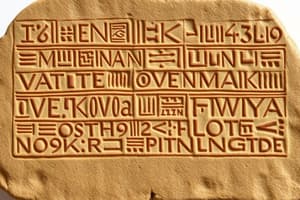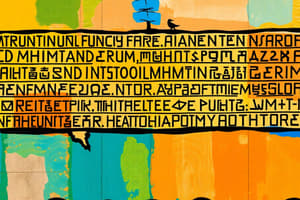Podcast
Questions and Answers
What significant advancement in transportation did Mesopotamians invent?
What significant advancement in transportation did Mesopotamians invent?
- Sailboat
- Chariot
- Wheelbarrow (correct)
- Horse-drawn carriage
Which architectural structure was developed by Mesopotamians for religious purposes?
Which architectural structure was developed by Mesopotamians for religious purposes?
- Ziggurat (correct)
- Stupa
- Colosseum
- Pyramid
What is one of the earliest known works of literature that captures Mesopotamians' philosophical and spiritual ideals?
What is one of the earliest known works of literature that captures Mesopotamians' philosophical and spiritual ideals?
- The Epic of Gilgamesh (correct)
- The Odyssey
- The Iliad
- The Aeneid
Which innovation facilitated the exchange of goods and information across vast distances in Mesopotamia?
Which innovation facilitated the exchange of goods and information across vast distances in Mesopotamia?
Mesopotamians worshipped various deities, each with specific spheres of influence, and developed elaborate rituals and mythology. What role did the deities play in their lives?
Mesopotamians worshipped various deities, each with specific spheres of influence, and developed elaborate rituals and mythology. What role did the deities play in their lives?
What aspect of Mesopotamia's ancient civilization continues to be studied to understand its influence on modern societies?
What aspect of Mesopotamia's ancient civilization continues to be studied to understand its influence on modern societies?
What was the main factor that allowed farming to be possible in Mesopotamia?
What was the main factor that allowed farming to be possible in Mesopotamia?
Which civilization developed the Code of Hammurabi, one of the earliest known sets of laws?
Which civilization developed the Code of Hammurabi, one of the earliest known sets of laws?
What form of writing did Mesopotamians use to record information and communicate?
What form of writing did Mesopotamians use to record information and communicate?
Which ancient civilization contributed significantly to astronomy and developed the sexagesimal system?
Which ancient civilization contributed significantly to astronomy and developed the sexagesimal system?
What role did trade guilds play in Mesopotamia's social structure?
What role did trade guilds play in Mesopotamia's social structure?
In what fields did Mesopotamians apply mathematics beyond basic calculations?
In what fields did Mesopotamians apply mathematics beyond basic calculations?
Study Notes
Mesopotamia's Enduring Legacy: The Ancient Civilization
Mesopotamia, a cradle of human civilization, flourished along the fertile lands between the Tigris and Euphrates rivers from around 4000 BCE to 600 BCE. The ensuing centuries saw innovation, invention, and growth that would forever shape the world.
Geography and Agriculture
Mesopotamia's fertile lands were a result of the rivers' flooding, leaving deposits of silt that made farming possible. The Sumerians, Akkadians, and Babylonians, among other cultures, developed irrigation systems and crop rotation methods to maintain the region's agricultural productivity, which provided a stable food source for the growing population.
Social Structure and Governance
Mesopotamians established complex social structures that included various trade guilds, religious institutions, and early forms of government. The earliest known written laws—the Code of Hammurabi—were inscribed in cuneiform, a form of writing that allowed Mesopotamians to record information, keep accounts, and communicate between regions.
Advancements in Science, Technology, and Mathematics
Mesopotamia's innovations in science, technology, and mathematics were revolutionary. The Babylonians contributed to astronomy, developing the sexagesimal system still used today. They also created the world's first mathematical tables and applied mathematics to land surveying and construction. In architecture, they developed the ziggurat, a multi-tiered temple structure, and invented the wheelbarrow, a significant advancement in transportation.
Religion and Philosophy
Mesopotamians' religious beliefs were deeply intertwined with their daily lives. They worshipped various deities, each with specific spheres of influence, and developed elaborate rituals and mythology. The epic of Gilgamesh, one of the earliest known works of literature, captures their philosophical and spiritual ideals.
Trade and Communication
Mesopotamia's strategic location facilitated trade and communication between regions. The development of the wheel and the invention of writing allowed the exchange of goods and information across vast distances, fostering cultural exchange and growth.
Today, scholars and historians continue to study and analyze Mesopotamia's ancient civilization to better understand its profound influence on modern societies. The region's legacy persists in the fields of agriculture, law, mathematics, architecture, and literature, providing valuable lessons about human creativity and resilience.
Remember, the search terms provided do not directly relate to the content above. The search results included updates about AI features such as Bing Chat "No Search" and a Chrome extension to remove the "People also searched for" box on Google search results.
Studying That Suits You
Use AI to generate personalized quizzes and flashcards to suit your learning preferences.
Description
Test your knowledge on the enduring legacy of Mesopotamia, the ancient civilization that thrived between the Tigris and Euphrates rivers. Explore topics such as geography, agriculture, social structure, science, technology, religion, trade, and more.




